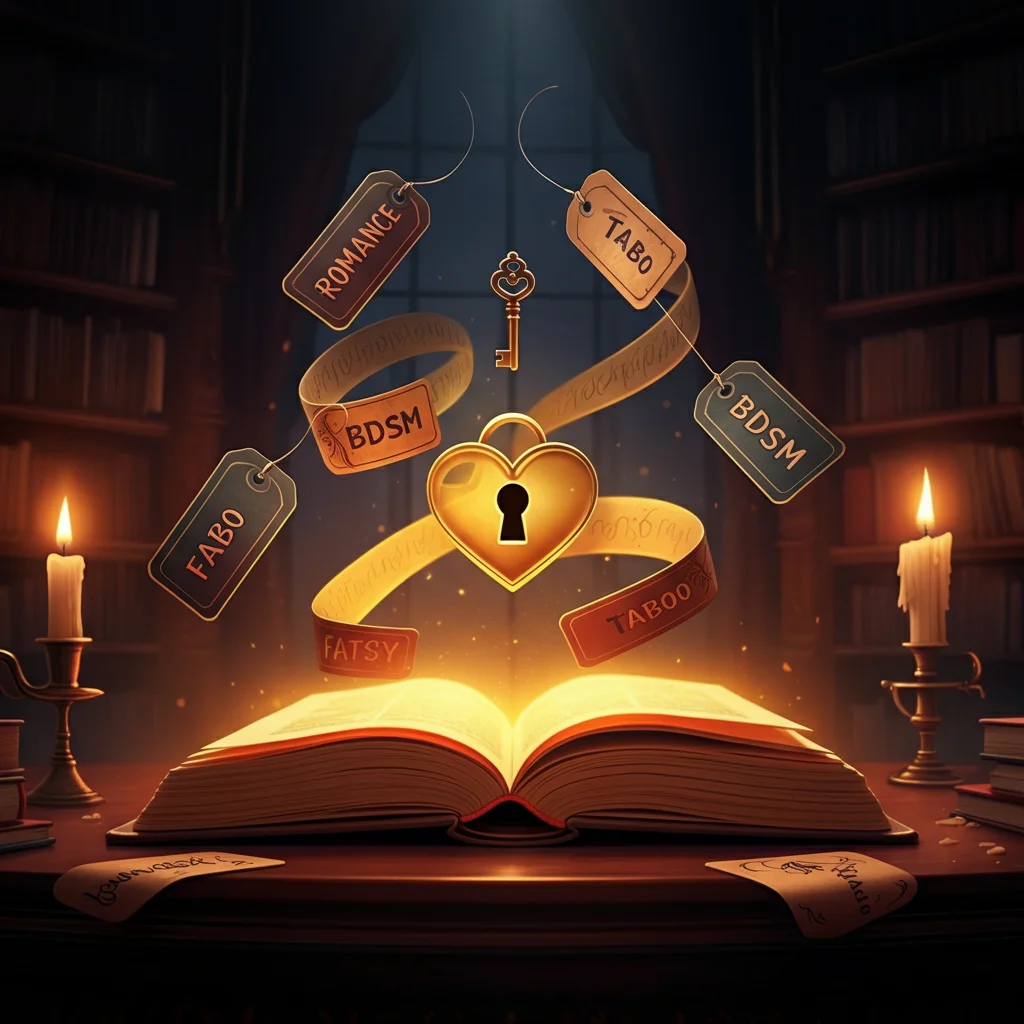Digital storytelling has evolved dramatically over the past decade, reshaping how readers discover and engage with content across all genres. Within the realm of erotic literature, a powerful categorization system has emerged that’s revolutionizing content discovery: Literoticatags.
These specialized tags function as sophisticated organizational tools that help readers navigate vast libraries of adult fiction with unprecedented precision. Unlike traditional browsing methods that relied on broad categories, Literoticatags enable users to find stories that match their specific interests, preferences, and fantasies.
Consider a reader searching for workplace romance stories. Rather than scrolling through hundreds of general romance titles, they can simply search for #OfficeAffair tags to instantly access relevant content. This targeted approach has transformed both the reader experience and the way authors connect with their audiences.
The impact extends beyond simple convenience. Literoticatags have created new opportunities for niche storytelling, allowing authors to reach dedicated readerships and enabling readers to discover content they might never have found through conventional browsing methods.
The Digital Evolution of Erotic Storytelling

Erotic literature has undergone a remarkable transformation since the advent of digital publishing. What once existed primarily in underground publications and private collections has now found a thriving home online, reaching global audiences through platforms like Literotica, Archive of Our Own, and countless personal blogs.
The shift from physical to digital media eliminated many traditional barriers to entry. Authors no longer needed publishers or distributors to share their work, while readers gained access to diverse voices and perspectives previously marginalized by mainstream publishing houses. This democratization has resulted in an explosion of creative content spanning every conceivable theme and interest.
Digital platforms also introduced new forms of reader engagement. Comment sections, rating systems, and direct author-reader communication have created dynamic communities around erotic fiction. These interactions influence story development and help authors understand their audience preferences in real-time.
The proliferation of mobile devices has further accelerated this transformation. Readers can now access adult literature privately and conveniently, leading to increased consumption and broader acceptance of the genre as legitimate entertainment.
Understanding How Literoticatags Function
Literoticatags operate on a simple yet effective principle: descriptive keywords that capture essential story elements. Authors assign these tags to their work, creating searchable metadata that helps readers locate specific content types.
The tagging process typically involves identifying key themes, character types, settings, and narrative elements within a story. For example, a tale about a clandestine relationship between colleagues might include tags like #OfficeAffair, #SecretRelationship, and #PowerDynamics. A story exploring infidelity themes could feature #Cheating tags, while exotic location-based narratives might use geographical identifiers like #Paris or #Tokyo.
Character archetype tags have proven particularly popular among readers. Stories featuring #Dominant or #Submissive characters attract specific audiences seeking particular relationship dynamics. These descriptive markers allow for precise content curation that serves both casual browsers and readers with specific preferences.
The collaborative nature of tagging systems means that communities often develop informal standards and conventions. Popular tags emerge organically based on reader demand and author creativity, creating an evolving vocabulary that reflects changing interests and cultural trends.
The Transformation of Content Discovery

Traditional content discovery in erotic literature relied heavily on broad categorization systems that often failed to capture story nuances. Readers faced the frustrating task of sifting through generic categories like “Romance” or “Adult Fiction” to find content matching their interests.
Literoticatags have revolutionized this process by enabling granular content filtering. Readers can now combine multiple tags to create highly specific searches. Someone interested in historical settings with dominant characters might search for both #Victorian and #Dominant tags simultaneously, dramatically narrowing their results to relevant stories.
This enhanced discoverability benefits authors significantly. Writers creating niche content can now reach targeted audiences who actively seek their specific story types. A author writing about unconventional relationships or rare fetishes can use appropriate tags to connect with readers who share those interests, rather than hoping their content surfaces through general browsing.
The system also facilitates serendipitous discovery. Readers exploring one tag often encounter related tags they hadn’t considered, leading them to new genres and themes. This cross-pollination effect has contributed to the diversification of reader interests and author experimentation.
Addressing Valid Concerns and Criticisms
Despite their benefits, Literoticatags face legitimate criticism from various perspectives. Critics argue that reducing complex narratives to simple keyword tags oversimplifies storytelling and may encourage authors to prioritize marketability over artistic expression.
The concern about narrative oversimplification has merit. Rich, nuanced stories that explore complex human relationships and emotions risk being reduced to searchable keywords that don’t capture their full depth. This could potentially discourage authors from developing sophisticated plots in favor of easily categorizable content.
Another significant concern involves the potential glorification of unhealthy relationship dynamics. Tags like #Cheating or #NonConsent, while serving legitimate reader interests, may normalize or romanticize behaviors that are problematic in real-world contexts. Critics worry about the impact on readers who might internalize these fictional dynamics as acceptable relationship models.
The reinforcement of harmful stereotypes represents another valid concern. Character archetype tags might perpetuate limiting representations of gender roles, sexual orientations, or relationship structures. This could restrict rather than expand readers’ perspectives on human sexuality and relationships.
Authors face pressure to conform to popular tagging trends, potentially stifling creativity and experimental storytelling. The desire to reach larger audiences through trending tags might discourage innovative narrative approaches that don’t fit established categories.
The Promising Future of Literoticatags
Artificial intelligence and machine learning technologies are poised to enhance the Literoticatags system significantly. AI-powered recommendation engines could analyze reading patterns to suggest new tags or stories, creating more personalized discovery experiences for users.
Automated tagging systems might help authors identify appropriate tags for their stories by analyzing text content and suggesting relevant keywords. This could improve tagging accuracy while reducing the burden on individual authors to manually categorize their work.
The integration of social features could transform Literoticatags into community-driven discovery tools. Reader-generated tag suggestions, collaborative tagging projects, and tag-based discussion forums could create richer engagement opportunities around erotic literature.
Cross-platform compatibility represents another frontier for development. As various publishing platforms adopt similar tagging systems, readers might eventually search across multiple sites simultaneously, accessing broader content libraries through unified tag-based queries.
Enhanced privacy features could address concerns about user tracking and data collection while maintaining the personalization benefits that make tagging systems valuable for content discovery.
FAQ About Literoticatags
What are Literoticatags and how do they work?
Literoticatags are descriptive keywords that authors use to categorize erotic stories based on themes, characters, settings, and content elements. They function like social media hashtags, making stories searchable and discoverable by readers with specific interests.
How do Literoticatags differ from traditional hashtags?
While similar in concept, Literoticatags are specifically designed for adult fiction categorization. They often describe intimate themes, relationship dynamics, and adult content elements that wouldn’t be appropriate for general social media hashtags.
What types of stories are suitable for Literoticatags?
Any erotic or adult fiction can benefit from Literoticatags, including romance novels, short stories, serialized fiction, and experimental narratives. The key is using accurate, descriptive tags that reflect the story’s actual content.
Are there any limitations to using Literoticatags?
Yes, limitations include potential oversimplification of complex narratives, pressure to conform to popular trends, and the risk of reducing artistic works to marketable keywords. Additionally, some platforms may restrict certain types of tags.
How can I create effective Literoticatags for my story?
Focus on accurately describing key story elements including setting, character types, relationship dynamics, and major themes. Research popular tags in your genre and consider what readers searching for your story type might use as search terms.
What are the potential benefits of using Literoticatags?
Benefits include improved story discoverability, targeted audience reach, enhanced reader satisfaction through better content matching, and opportunities for authors to connect with niche readerships who appreciate their specific storytelling style.
How can I report inappropriate or misleading Literoticatags?
Most platforms hosting erotic literature have reporting mechanisms for inappropriate content or misleading tags. Look for “Report” buttons near stories or contact the platform’s moderation team directly through their support channels.
Will AI play a role in the future of Literoticatags?
AI will likely enhance Literoticatags through improved recommendation systems, automated tag suggestions, and more sophisticated content matching algorithms that can analyze story text to suggest appropriate categorization.
How can Literoticatags help new readers discover my work?
Proper tagging ensures your stories appear in relevant searches, helping readers actively seeking your story type find your content. This targeted discovery is often more effective than hoping readers stumble upon your work through general browsing.
What are some best practices for using Literoticatags effectively?
Use specific, accurate tags that genuinely reflect your story content. Avoid over-tagging or using misleading keywords. Research your genre’s popular tags and consider combining broad and specific tags to maximize discoverability while maintaining accuracy.
Shaping the Future of Digital Literature
Literoticatags represent more than a simple organizational tool—they embody a fundamental shift toward reader-centric content discovery in digital publishing. By empowering readers to find precisely the content they seek while helping authors reach their intended audiences, these systems have created new possibilities for creative expression and community building.
The technology continues evolving, promising even more sophisticated ways to connect stories with readers. As AI advances and platforms develop more nuanced tagging capabilities, the potential for meaningful literary discovery will only expand.
For readers and writers willing to engage thoughtfully with these tools, Literoticatags offer unprecedented opportunities to explore, create, and connect within the rich landscape of modern erotic storytelling. The key lies in using them responsibly while maintaining appreciation for the complex human experiences they represent.


